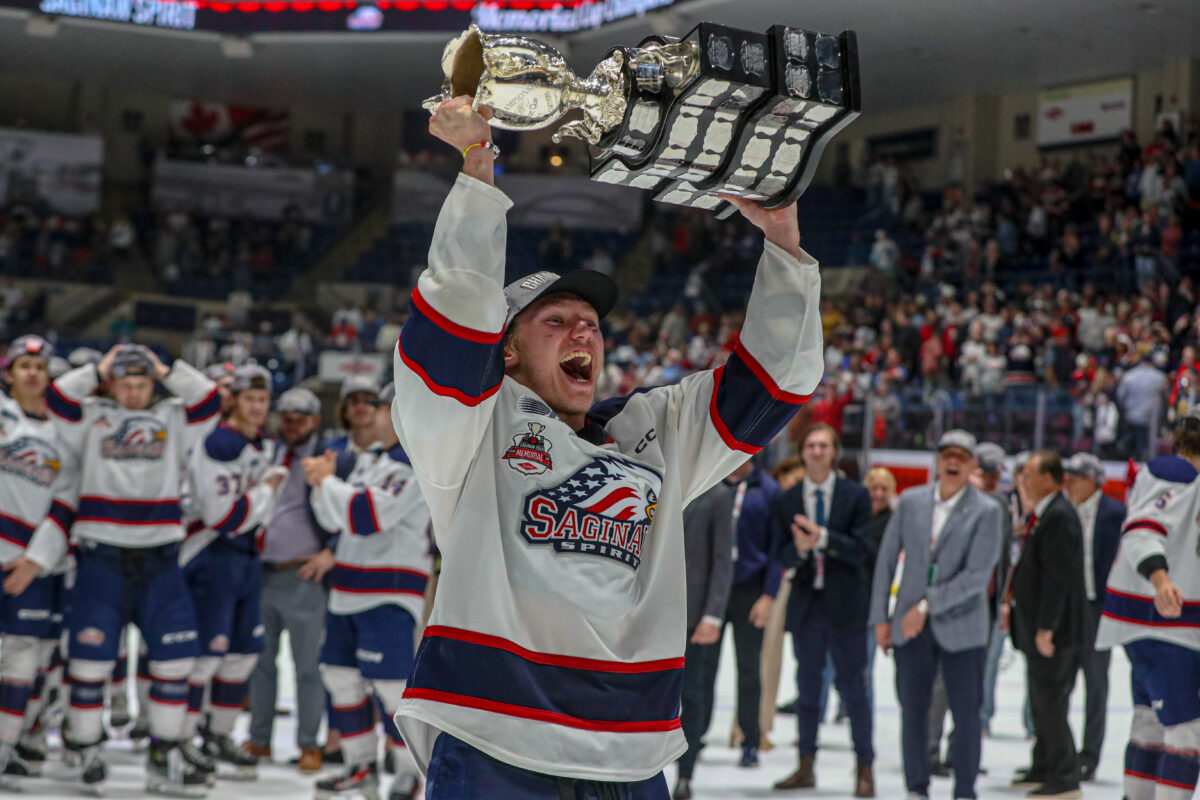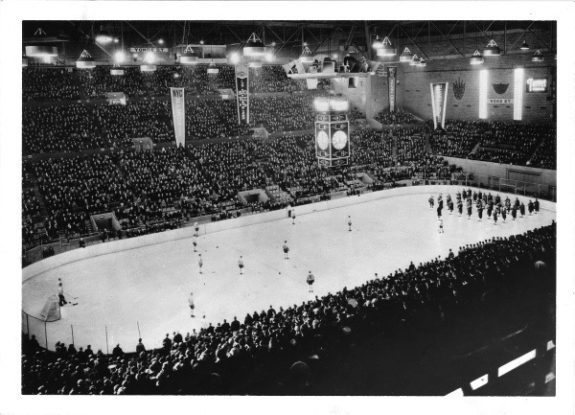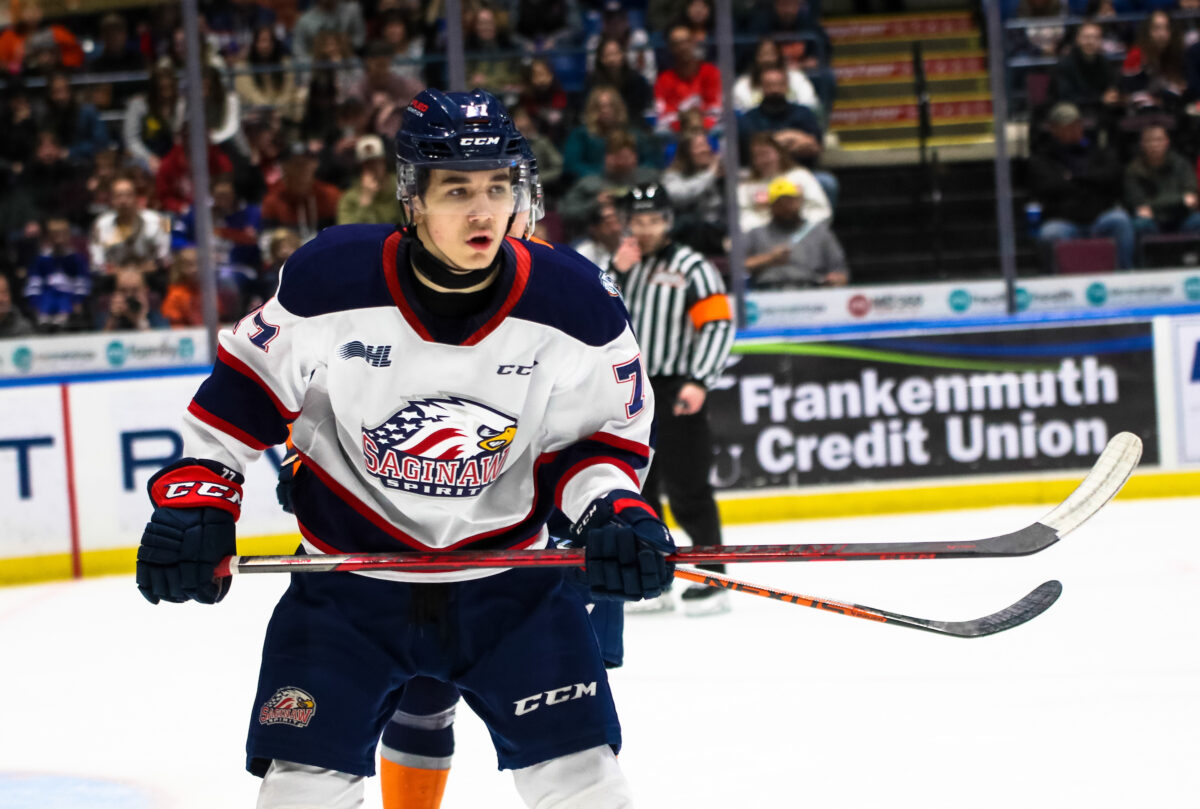The 2024 Memorial Cup was definitely one for the history books. The Saginaw Spirit’s storybook win over the Ontario Hockey League’s (OHL) champion, the London Knights, gave the franchise its first trophy since relocating from North Bay in 2002 as well as the first time the trophy ever came to Michigan. The Spirit also became just the second American team to win the Cup while hosting, following the 1983 Portland Winter Hawks, who were the very first American host in Memorial Cup history.
Ever since the host team was introduced as part of the Memorial Cup tournament in 1983, it’s been every franchise’s dream to take home the Cup in front of their home fans. Every summer, junior teams across the Canadian Hockey League (CHL) clamour to secure the opportunity to host, and this summer alone, three teams have announced bids for 2026: the Lethbridge Hurricanes, Brandon Wheat Kings, and the Kelowna Rockets. Not only do they get to showcase their team and city at arguably the most prestigious tournament in junior hockey, but they also get a home-ice advantage, giving the host team that much-needed boost to take home the coveted trophy.

But, every time the host team wins, there are those calling for a restructure of the competition. Those voices were especially loud in 2022 after the host Saint John Sea Dogs took home the top prize after they were eliminated in the first round of the Quebec Maritime Junior Hockey League (QMJHL) Playoffs, leading some to call the team an undeserving champion. Yet it’s an embarrassment to the storied tournament if the host team doesn’t at least put up a good fight. Due to the immense costs foisted upon small markets, fewer teams are now interested in taking on the responsibility. In preparing for the 2025 tournament, at least one QMJHL community told their team’s owner not to apply at all.
However, having a host team is not only good for the tournament, but good for junior hockey. Not only does it shine a spotlight on smaller markets across the CHL but it allows the various leagues to remain closely competitive, preventing one from dominating for too long. But, rather than take my word for it, let’s look at the history of the tournament and some of the biggest successes and failures when it comes to hosting the Memorial Cup.
History of the Memorial Cup
When the first Memorial Cup was played back in 1919, only two teams qualified for the competition. It was pitted as an East vs. West challenge, with the best team from Ontario, Quebec, and the Maritimes facing the winner of the Abbott Cup, which was awarded to the best team from Alberta, British Columbia, Manitoba, and Saskatchewan. The series also only lasted two games, with the team that scored the most goals declared the winner. No host was selected; instead, to keep travel costs lower, the games would be played in either Toronto or Winnipeg.
The first series saw the University of Toronto Schools take on the Regina Patricias, and despite dominating the competition out west, the home team won easily by a score of 29-8. However, more often than not, playing in a neutral location removed any home-ice advantage. From 1919 through 1954, only eight teams won while playing in their home city. Toronto-based teams took home five titles, while the Winnipeg Monarchs were the only Winnipeg-based team to win it in Winnipeg in 1935. The other two, the Barrie Flyers and Montreal Junior Canadiens, split games between Toronto and their home locales, which seemingly was all that was needed to take home the win.

However, in that time frame, Ontario teams won the Memorial Cup series 21 times, with Manitoba coming in second with nine. Meanwhile, Alberta, Saskatchewan, and Quebec combined for six. Parity was virtually nonexistent, and even though the tournament had been expanding the series from two games up to a best-of-seven series, the results remained the same. By 1954, with travel costs decreasing, it was decided to let one of the competing teams host. Strangely enough, the new format started with some familiar faces, with the Pats taking on the OHL’s Toronto Marlboros, this time in Regina. The result was the same as in 1919, with the Marlboros winning easily four games to one, but that series turned out to be an outlier; 12 of the next 16 tournaments went to the host team.
Related: The Great WHL Adventure #4: Medicine Hat Tigers
Despite the change, Ontario still dominated the Memorial Cup, with the province taking home all but seven of the next 16 competitions. Thus, another change was needed, and with the newly-formed Western Canada Hockey League, later shortened to the Western Hockey League (WHL), the series became a three-team tournament in 1972 with the top two teams playing a single winner-take-all game for the Cup. The games also shifted back to a neutral location but with an asterisk – the host would rotate between the three competing leagues. In this format, only three “hosts” won the Cup over the next decade: the Pats won it in Calgary in 1974, the Marlboros won it in Kitchener in 1975, and the New Westminster Bruins took it home in 1977 in Vancouver. However, the host league was often in the Final, with them sitting out of the last game just three times.
The host may not have had the same dominant advantage as before, but the competition was much more even. Ontario still came out on top over the next 11 tournaments, winning five, but the WHL and QMJHL weren’t far behind with three wins apiece. But one more change took place in 1983 when a fourth pre-determined host team was added. The WHL chose to bestow that honour on the Portland Winter Hawks, who had won the league title in 1981-82 and gone to the Memorial Cup tournament in Hull, Quebec but finished third. Now a more experienced team, they didn’t waste their second chance, losing just one game to an 8-3 victory over the Oshawa Generals to claim their first Memorial Cup in franchise history.
Memorial Cup Hosts Increase Parity
It’s been 40 tournaments since the last rule change and it doesn’t seem like it will be restructured any time soon. That’s because, for the first time since the Memorial Cup was introduced, no league has run away with the title. The WHL currently sits in the lead with 15 wins, followed closely by the OHL’s 13 wins and the QMJHL’s 11, and despite sitting third, they are the only league that’s strung together four-consecutive wins. The reason, it seems, that things have remained so balanced for so long is the inclusion of the host, which encourages one team to bulk up their roster to ensure they put on a good show.
When the Spirit were selected as host, they were in a good position in 2022 to be a top team in two years. They had just selected Michael Misa first overall in the OHL Priority Draft and added defenceman Zayne Parekh 18 picks later, both of whom were expected to be in pivotal roles with the team by 2023-24, but they weren’t going to leave anything to chance. Given that star Pavel Mintyukov just went 10th overall in the 2022 NHL Entry Draft, it seemed unlikely he would remain in the OHL for two more seasons, so he was shipped off to the Ottawa 67’s for nine picks, while captain Josh Bloom was sent packing to the North Bay Battalion for two prospects and five more picks.

Stripping down the roster a season before hosting the Memorial Cup seems risky, but the Spirit were gearing up for some big moves. Ahead of the 2023 Trade Deadline, they sent four picks to the Barrie Colts for Hunter Haight, then in 2023-24, they acquired Jorian Donovan, Rodwin Dionicio, Owen Beck, Alex Christopoulos, Ethan Hay, Aidan Castle, and Nolan LaLonde for a total of 22 picks and three prospects. They also re-signed Bloom after he was re-assigned by the Vancouver Canucks. These moves proved crucial in Saginaw’s success, with seven of their top-10 scorers at the Memorial Cup acquired after being named hosts. Parekh, Misa, and Joey Willis were big performers during the regular season, but the big stars were put front and centre when it came time for the big games.
While selling off your future might not seem like a good move, it helps spread the talent around the league. Most of the players the Spirit added were 19 and 20-year-olds and high NHL picks, meaning they would only be around for another season or two. That doesn’t help a team near the bottom of the standings, so, when a team like the Spirit come calling after their stars, they can demand high prices knowing that they’ll likely be met to quickly rebuild. The Spirit can capitalize on the primes of their stars and add talent around them, while teams like the Peterborough Petes and Windsor Spitfires get a chance to add plenty of future pieces. So, not only does that help even the playing field in the Memorial Cup, but it also helps each league stay healthy and avoid dynasties and perennial bottom-dwellers.
Hosts Have a Clear Goal to Aim For
The Spirit are far from the first team to load up in preparation for the Memorial Cup. Even back in 1983, the Winter Hawks added goalie Mike Vernon just for the tournament, who was named the top goaltender following the historic win. But it’s not the only aspect that goes into building a winning team. When the Moose Jaw Warriors head coach Mark O’Leary was asked what needed to be done to get his team ready, he responded, “I think our group was built for this if you look at it over the course of the season, and even over the last three years, we play our best hockey against the teams that are the best.” Having a target helps focus a team’s goal, and since bids are secured two years before the tournament, hosts are mentally prepared for the increased competition.
Just look at the 2018 Pats, who secured the bid to host the historic 100th-year celebration, ended the 2017-18 WHL season with one of the highest win totals in the league, but were up against the dominant Swift Current Broncos in the first round and fell in seven games. However, once the Memorial Cup rolled around, they brought their A-game, beating the Broncos and the Hamilton Bulldogs twice to secure a spot in the Final against the QMJHL’s Acadie-Bathurst Titan, where they fell 3-0. It was a similar run for the 2017 Windsor Spitfires, who won it all after being eliminated in the first round of the OHL playoffs.
But it’s not just in the Memorial Cup that hosts get a boost. Since 1983, seven host teams also won their league championship, allowing the runner-up to compete as the fourth team. All seven teams made it to the Memorial Cup Final and three claimed the Memorial Cup, with the most recent being the 2005 Knights. Eight more hosts entered the tournament as runners-up, and of those, three overcame the odds and took home the Cup, while only one missed the Final entirely.
Hosts that Struggled to Compete
There’s a better-than-average chance that the host will win the Memorial Cup. With 12 wins since 1983, they have a 30% win percentage, which is slightly higher than the expected 25% in a four-team tournament. But not every host thrives under the pressure.
In 1988, the Chicoutimi Sanguenees were preparing to host the tournament, but in the QMJHL Playoffs, they suffered a 4-2 first-round upset at the hands of the Shawinigan Cataractes. Despite finishing fourth overall, they were stripped of the right to send a team to the tournament, with the rummers-up Drummondville Voltigeurs taking their place as “host.” Two years later, the Hamilton Dukes also lost out on sending a team while playing host after finishing dead last in the OHL standings, as did the Beauport Harfangs, who were set to host in 1991 but finished third last in the QMJHL. Both were replaced with runners-up.
Since then, no team has been replaced as host, although there have been times when it could have been considered. In 2001, the Pats finished fifth in the WHL and were eliminated in the first round, but still managed to beat the Red Deer Rebels, the eventual champions, in the final round-robin game and finished third following an overtime loss to the Val-d’Or Foreurs. 2002’s hosts, the Guelph Storm, were even worse, finishing eighth in the OHL and finishing fourth in the Memorial Cup with just one win. But one of the worst showings was from the Saskatoon Blades in 2013. They were swept in the opening round of the WHL playoffs and then finished last at the Memorial Cup with just one win, which came against Nathan MacKinnon’s Halifax Mooseheads, who went on to win their first trophy.
Thankfully, those are rare occurrences. 24 of the 40 hosts have made it to the Memorial Cup Final, and since 2017, the tournament’s host finished lower than second just once, that being the 2023 Kamloops Blazers. The tournament host may not have earned the right to compete at the Memorial Cup in the traditional sense, but they certainly aren’t undeserving champions. Choosing a Memorial Cup host allows the smaller markets to remain competitive against those in bigger, richer centres, and when the smaller teams get a chance, everyone wins.
